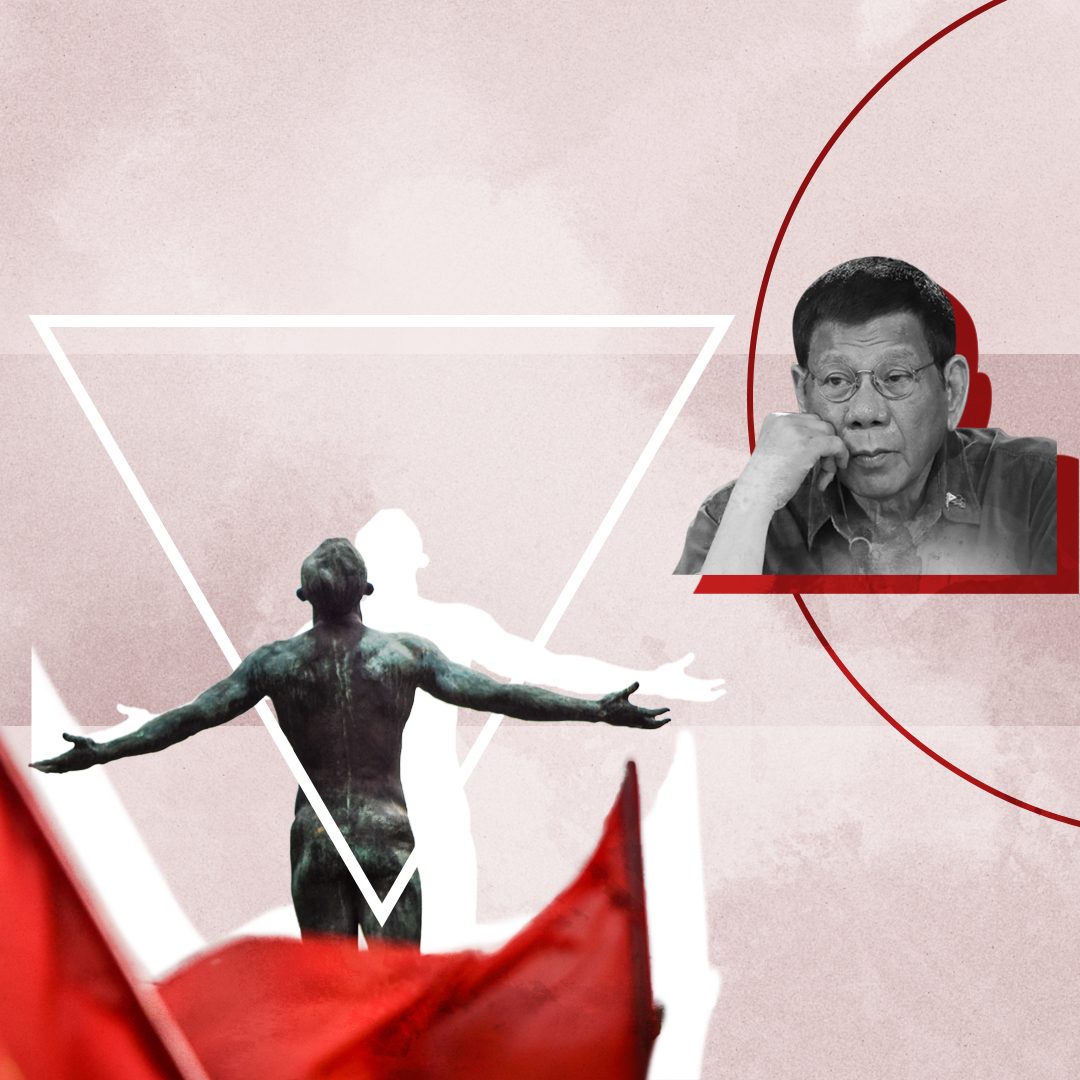SUMMARY
This is AI generated summarization, which may have errors. For context, always refer to the full article.

“UP, fine, maghinto kayo ng aral (stop school), I will stop the funding.”
In his late night address on Tuesday, November 17, President Rodrigo Duterte threatened to cut funding for the University of the Philippines (UP) after being told about the academic strike. (READ: Academic strike? Duterte threatens to defund UP)
Duterte lashed out at UP students, saying that “they do nothing, but recruit communists.”
“Walang ginawa itong ano kung ‘di mag-recruit ng komunista diyan. Tapos nag-aaral kayo, ang gusto ninyong binibira ang gobyerno. Masyado naman nakasuwerte kayo,” said the Chief Executive.
(They do nothing but recruit communists. Then you study, but you love to criticize the government. You’re getting too lucky.)
But the President was somehow confused about the proponents of the academic strike. It was the students from the Ateneo de Manila University – home to the children of some politicians and government officials – who launched it starting Wednesday, November 18, to call out the government for its inaction in relation to the consecutive typhoons that hit the country.
In a television interview on Wednesday, Presidential Spokesperson Harry Roque said that he told the President that it was the Ateneo students who pushed for an academic strike, but someone in the Cabinet meeting told Duterte, “No, UP Manila also called for an academic strike.”
UP as national university
But what the President forgot was he cannot stop funding the country’s premier university, which has contributed much in terms of research and technologies, using its “multidisciplinary research expertise,” especially in this time of the pandemic.
There’s a law – RA 9500 or the University of the Philippines Charter of 2008 – that states it is the “policy of the State to strengthen the University of the Philippines as the national university.”
UP, which enjoys “institutional autonomy,” shall be treated in a manner “consistent with its institutional requirements as the national university by the service-wide agencies in the exercise of their respective jurisdiction.”
This means that the national government cannot dictate how it will teach its students and what the students should be doing, Legal expert Tony La Viña told Rappler in an interview on Friday, November 20.
According to the law, UP as national university shall “recommend its annual budget to the President of the Republic of the Philippines and Congress.”
La Vińa said that Duterte could “try to lessen” the budget proposal of UP, but the Congress will “always increase it anyway.”
“UP has supporters in both the House and the Senate,” he added.
In the Philippines, the Department of Budget and Management drafts a proposal for the budget of each agency and constitutional body of government, which Congress deliberates on because it holds the power of the purse. (READ: Slides and Ladders: Understand the budget process)
In an interview with ANC on Wednesday, Senator Francis Pangilinan, a lawyer, said that defunding UP is “legally infirm.”
La Viña said that Duterte can only defund UP if Congress abolishes the institution, which is next to impossible.
Lessen UP budget?
UP vice president for public affairs Elena Pernia said on Thursday that the threat of the President would definitely affect 50,000 to 60,000 students, 5,500 faculty members, around 5,000-strong academic staff in 16 campuses and 8 other attached units.
Since defunding seems far-fatched due to legalities, La Viña said that if Congress decides to lessen UP funds, this would have significant effects on its nationwide operations – less students, less programs.
Under the law, UP has a social responsibility to serve the country, and “relate its activities to the needs of the Filipino people and their aspirations for social progress and transformation, and provide venues for student volunteerism.”
Other agencies and branches of the Philippine government, as well as any constitutional body, may request UP to “conduct research or provide advice on any matter involving public policy” with resources or budget provided by the requesting agency.
In a statement on Friday, UP Diliman chancellor Fidel Nemenzo said that Duterte’s threat to defund UP “stemmed from a misunderstanding that UP does nothing except to recruit communists.”
“Those who blame UP for breeding communists forget that UP has bred more scientists, artists, doctors, lawyers, diplomats and civil servants,” he added. (READ: Chancellor Nemenzo: No place for ‘bigotry, red-tagging’ in UP)
UP earlier noted that 15 members of the Duterte administration are its alumni, including Presidential Spokesperson Harry Roque, Tourism Secretarty Bernadette Romulo-Puyat, Education Secretary Leonor Magtolis-Briones, Science Secretary Fortunato dela Peña, and Higher Education Chairman Prospero de Vera III.
Does Duterte’s threat to defund UP have legal basis? For La Viña, it’s nothing but an “empty threat.” – Rappler.com
Add a comment
How does this make you feel?
![[OPINION] Rodrigo Duterte and his ‘unconditional love’ for China](https://www.rappler.com/tachyon/2024/04/rodrigo-duterte-xi-jinping-august-2019.jpeg?resize=257%2C257&crop=91px%2C0px%2C900px%2C900px)



![[The Slingshot] Lito Patay’s 4 hours and 38 minutes of infamy](https://www.rappler.com/tachyon/2024/07/Lito-Patay-4-hours-infamy-July-19-2024.jpg?resize=257%2C257&crop=233px%2C0px%2C720px%2C720px)
There are no comments yet. Add your comment to start the conversation.